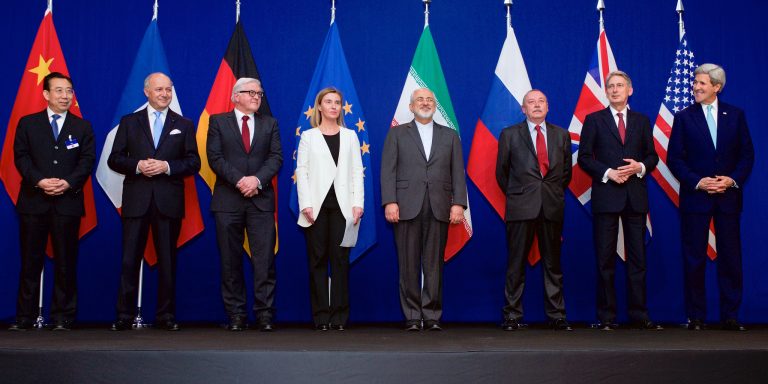INTELBRIEF
January 8, 2018
IntelBrief: The Iran Nuclear Deal in the Balance

- President Donald Trump must decide whether to keep the United States in the 2015 multilateral nuclear accord with Tehran, with ongoing unrest in Iran a likely factor in that decision.
- The Trump Administration has consistently argued that the accord is a flawed agreement that provides Iran’s clerical leadership with billions of dollars to expand Iran’s regional influence and suppress the Iranian population.
- Most senior U.S. officials argue that withdrawing from the deal would both undermine Iranian protestors and cause a significant diplomatic rupture between Washington and its European allies.
- The most likely outcome of the internal U.S. debate will be targeted sanctions on Iranian human rights abusers and other aspects of Iranian policy unrelated to the nuclear deal itself.
Over the coming days, the Trump Administration will announce key decisions on issues related to the 2015 multilateral Iran nuclear accord. The landmark accord curtailed Iran’s nuclear program in return for sanctions relief. The first decision—whether President Trump will certify, under U.S. law, that Iran is complying with its terms—is likely inconsequential. Refusing to certify, as President Trump did last October, does not terminate U.S. participation in the agreement, but gives Congress the opportunity to vote on whether to remain in it or not. According to Secretary of State Rex Tillerson in an interview on January 5th, Congress is considering either ending the requirement that the President certify Iran’s compliance, or changing the law to require certification less frequently. The second decision—whether to continue to waive U.S. sanctions on Iran—is far more consequential. A choice to discontinue the waivers, and thereby re-impose U.S. sanctions, would amount to U.S. withdrawal from the agreement and almost certainly cause the deal’s wholesale collapse.
President Trump has been unsparing in his harsh criticism of the Iran nuclear accord. In his view, the deal is fatally flawed by its failure to address a range of threats -'including Iran's missile program, it's support for regional armed factions and restrictions on the country's nuclear program that expire by 2030. That hasn’t stopped the White House from maintaining the sanctions waivers and staying in the agreement, though with the stated expectation that Congress and U.S. allies in Europe would act to address the deal’s flaws. However, neither Congress nor U.S. allies have agreed yet on changing the accord, giving the President potential justification to assert that his requirements for remaining in the accord were not satisfied.
Meanwhile, significant unrest in Iran that began on December 28, while apparently winding down, could also prompt the President to re-impose sanctions. Many critics of the Tehran regime, including President Trump, believe that along with its other flaws, sanctions relief has provided Iran with billions of dollars to enrich the Islamic Revolutionary Guard Corps (IRGC) and other instruments of state suppression. The President could decide that re-imposing sanctions would embolden and broaden Iran’s domestic opposition, much of which appears to be reacting to the country’s lagging economy.
However, many of the President’s senior advisers, along with European and some Congressional leaders, argue that the unrest in Iran represents a significant additional justification for the United States to stay in the agreement. A U.S. withdrawal, the advisers argue, would enable Iran’s leaders to assert that the United States is again meddling in Iran’s affairs and that Iran’s economic difficulties are being caused by the United States, not the Iranian leadership’s own mismanagement and corruption. The President’s senior national security staff is also arguing against causing a rupture with U.S. allies in Europe, all of whom argue strongly that the Iran accord is working and should not be abandoned unless Tehran violates its terms. The President’s advisers, who seem likely to prevail for now, counsel that the United States should work with European leaders, such as French President Emmanuel Macron, who are trying to persuade Iran to enter new negotiations on limitations to its ballistic missile program.
If President Trump, as is likely, accepts the recommendations to remain in the accord, he is certain to insist that President Macron and other European leaders join the United States in pressuring Iran on a number of fronts. He could then, in conjunction with Congress, impose new sanctions on entities that assist Iran’s missile program, or provide the equipment Iran uses to monitor or block social media or other media outlets. Five additional Iran missile-related entities were already sanctioned by the Treasury Department on January 4. The President is also certain to sanction Iranian officials identified as responsible for the arrests of 1,000 protestors over the past week, although the effect of such sanctions on these individuals is likely limited. The confluence of anti-government protests in Iran and the fraught deadlines of the nuclear accord demonstrates yet again how interlocking issues resist separation into distinct resolutions.
For tailored research and analysis, please contact: info@thesoufancenter.org
[video width="960" height="540" mp4="https://thesoufancenter.org/wp-content/uploads/2018/01/Final-Edit-1-104.mp4" poster="https://thesoufancenter.org/wp-content/uploads/2018/01/16389773974_6a84f83211_k.jpg"][/video]